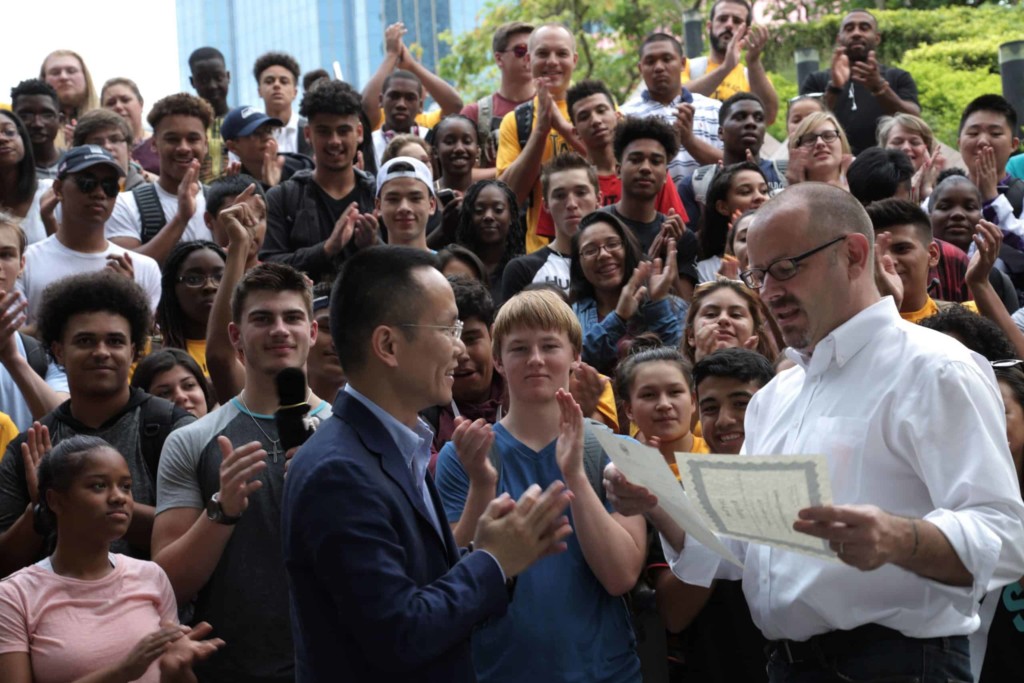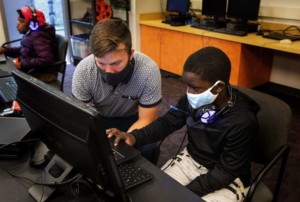Getting Clearer: The Principal, Mayor of the School Community

By: Patrick Erwin
To many, the experience of the principal position can be elusive, with emphasis on building instructional management, budgets, and power. This is the first of our Principal stories, that opens up the heart that goes into building level leadership.
I am in my sixteenth year as principal of an amazing high school. Much has happened in my sixteen years – most of it good – and I am at that point in my career where reflection takes up a little more space in my brain. Part of that is because some things now run on autopilot, while part of it is due to the fact that sixteen years in one place makes you a little intellectually restless.
I often look at other institutions to see why they are successful (see churches and businesses). I ponder certain sports teams and their approach to attracting and retaining personnel for long term success. I consider the fact that we do not know what the future holds, so what does that mean for long-term, strategic planning?
One of the simple, yet complicated, questions I regularly consider is this: what is my job? That sounds simple enough. I am in charge of helping teachers educate students, maintain safety, comply with state and federal regulations, blah, blah, blah. I could cite Marzano, DuFour and ASCD publications chapter and verse, but that is not what I do daily. My bosses might not like to hear that, but my life is much more complicated than what those authors put in a book.
I have read, discussed and contemplated this topic ad nauseam, but it kept gnawing at me. I needed to get above the job to better understand what I was doing. Then one night it jelled because of a conversation with my wife.
My wife was the Mayor of Tacoma, WA – our home and the home of my school. She was elected while I was on the job and we had many discussions (and still do) about the role of cities and government. One evening we were discussing the range of things she addressed in her job, and it dawned on me that we were doing the same thing. We were both mayors of our “cities” – hers traditionally defined, mine not so much.
That may sound like I am attempting to be rather grand here, but when you think about it, it pencils out. I am the mayor of a small town of adolescents. I serve them food, I have a health center, I have a security force, and I provide entertainment in the form of sports and the arts. In fact, I have a taxing authority in terms of classroom fees and ASB dues. Most importantly, I teach them how to grow as people and engage with different entities (teachers, content, and skills) to make the school better. In short, the equivalents of restaurants, hospitals, police forces, entertainment centers and forums for civic engagement. Alas, we do not have a fire department, but they are just a call away. I am sure there are other elements that support my case, but you get the point.
This point of view is especially appropriate when you connect this to my belief about the work we do. Specifically: “The fate of the City of Tacoma depends on the work we do every day with our kids.”
I began saying this to explain that my teachers and staff members do vital work. If we fail our kids, they do not go to college, they do not hold down decent jobs, they do not pay into the tax system so we don’t fully fund our city, and we do not have the talent to attract companies to our city to give my students the jobs they and their families need. If we fail to adequately prepare our students for graduation and life after high school the city will suffer.
What does this look like? One example from last week comes to mind; a senior was dealing with an ill parent. This is one of the steadiest, responsible students I have, and I never would have known anything was wrong until a teacher said something was “off” and asked that I check-in. The student explained her mother had a debilitating illness which was causing the loss of her job and health insurance. The student and extended family were trying to keep the house, pay for utilities, have food on the table and care for the mom who was hospitalized. If the financial standing did not improve, she would need to move to another city to stay with her aunt. On top of that, she was waiting on word from colleges and trying to weigh the best options for financial aid. We addressed the matter by providing food assistance from our Community Resource Center, qualified the student for aid as an unaccompanied youth, and began to reach out to community agencies that might help with housing and utility bills. Lastly, we gave her some movie passes so she could take a break from the stress of her situation.
This sounds like an excerpt from Maslow’s A Theory of Human Motivation, but for us, it is our day-to-day work. Caring for our constituents in the hopes they live their best life. We did not solve everything, but we did put her in a place to stabilize things at home, finish here, and move on to college, knowing we are still here for her, even after she graduates.
If we do things well, our kids are successful, and our city is a great place to live. If not, we have a problem.
So, what do I do as a principal? I do the most important job in the city. I create the conditions for students and, by extension, their families, to be lifted out of poverty into a city that is a great place to live. Not a bad job. Not a bad life.
This blog is part of an ongoing Getting Smart series called Getting Clearer. The nature of this series and of our blog is to have a diverse set of voices and ideas to help us and our audience get clearer. Are there topics that you’re interested in #GettingClearer about? Email [email protected] with “Getting Clearer” in the subject line. For other blogs in the series, see:
- Getting Clearer: The Educational Imperative
- Getting Clearer: The Educational Imperative
- Getting Clearer: Educator Movements
- Getting Clearer: HQPBL As An Equity Imperative
- Getting Clearer: We Are All American Sons
For more, see:
- Preparing Principals: Consider the Adaptive Challenge
- How Does Wrap-Around Leadership Inspire Lifelong Learning in Principals?
- Interviews with Principals of Change
Stay in-the-know with innovations in learning by signing up for the weekly Smart Update.
Patrick Erwin is the Principal at Lincoln High School, Tacoma WA.






Lori G Thomas
YES!! A leader of school-as-community, including families, students, teachers, support staff, community members. This is exactly what the School Community Journal has been promoting through research and field reports for nearly 30 years.